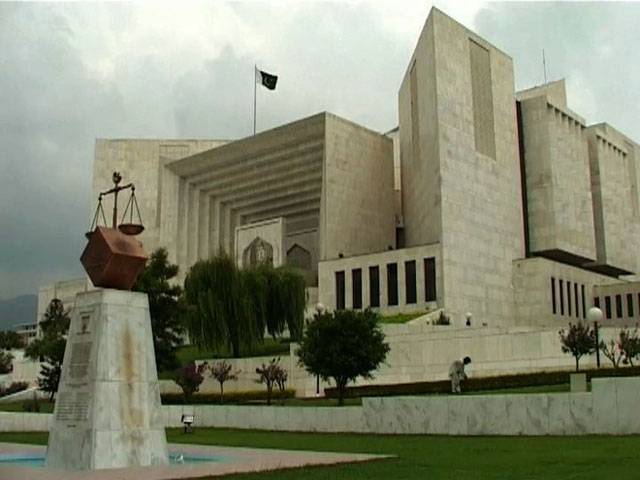ISLAMABAD - The Supreme Court on Monday said it will hear all the cases of death sentences by military courts together from March 7.
A larger bench of five-member, headed by Chief Justice Anwar Zaheer Jamali, also retained the execution of death sentences of the convicts till the next date of hearing.
The top court two-judge bench comprising Justice Dost Muhammad and Justice Qazi Faez Isa on February 9 had halted execution of Taj Muhammad and Ali ur Rehman, reportedly involved in the Army Public School, Peshawar, attack and Qari Muhammad Zubair allegedly involved in Nowshera and Imran Khan in Mardan bomb blast. Similarly, Justice Gulzar Ahmed heading a two-member bench on December 8, 2015, had stayed the execution of Qari Zahir Gul and Haider Ali.
Asma Jahangir and Latif Afridi, representing the convicts, informed that today (Wednesday) some of their cases have been fixed, while other cases of similar nature have not been taken up. Upon that the chief justice said all the appeals against the military courts’ convictions would be fixed on March 7 and heard together.
Attorney General of Pakistan submitted the record of military courts’ convicts but said: “It should be seen in-camera.” Asma said the families could not meet with the accused and due to this trial court proceedings seemed to be one sided.
Justice Saqib Nisar proposed to her to examine all the laws of ‘claim of privileges’. He said: “If the court decides them in your favour then it will be open for you to examine the record [trial court].”
These persons were awarded death sentences by the military courts set up in light of the 21st Constitutional Amendment and Pakistan Army (Amendment) Act 2015 last year. The sentences have been confirmed by Chief of Army Staff General Raheel Sharif.
Since the establishment of military courts number of militants, including facilitators of terror attacks were awarded death sentence.
The convicts’ families filed the writ petitions in the Peshawar High Court against the military courts judgment. However, the high court had dismissed them on the basis of not sufficient material. They therefore approached the Supreme Court against the high court orders.
The relatives of the convicts claimed that they came to know about the death sentences of their dear ones through newspapers or internet, adding the military courts have not supplied them copies of the judgment.
The appellants alleged that the convicts were not present during the trial conducted by military courts. No chance was given to cross-examine witnesses nor the witnesses were produced before the trial court, while the Peshawar High Court had ignored these facts.
They claimed that the army personnel produced the convicts hand cuffed and eyes blinded with a cloth covering their face in the military courts therefore the convicts did not see the court with their own eyes. The convicts were asked to put thumb impression on papers, while the convicts did not know what sort of papers were forwarded to them, they further alleged.
Friday, November 22, 2024
SC to hear mily courts execution cases from March 7

10:28 PM | November 18, 2024
Govt scheme to provide Rs 1.24bn airfare relief for pilgrims
8:53 PM | November 22, 2024
UN says 2024 'deadliest year on record' for humanitarian aid workers with 281 deaths globally so far
8:46 PM | November 22, 2024
Metro bus service to remain closed on Nov 24 ahead of PTI protest
8:10 PM | November 22, 2024
CM Maryam Nawaz approves scheme to provide three marla plots to people
8:02 PM | November 22, 2024
ATC issues verdict in May 9 case, sentences PTI workers to jail
7:12 PM | November 22, 2024
-
Lahore tops global pollution rankings as smog worsens, AQI reaches hazardous levels
-
Lahore tops global pollution rankings as smog worsens, AQI reaches hazardous levels
-
Hunger crisis to increase in South Sudan, warns UN
-
Pakistan’s judiciary champions climate justice at COP29 in Baku
-
Punjab struggles with persistent smog as Met Office forecast rainfall
-
Punjab residents face escalating smog crisis as pollution levels soar across country
UN Crossroads
November 22, 2024
Smog Trade-off
November 22, 2024
Undersiege Again
November 22, 2024
Land of Vigilantes
November 21, 2024
United in Genocide
November 21, 2024
Proposal to counter increasing cases of harassment
November 22, 2024
Critique of RFE/RL’s Coverage of the SCO Summit
November 22, 2024
Real vs Reel
November 22, 2024
Independent Supreme Court
November 21, 2024
Fat Loss Fantasy
November 21, 2024
ePaper - Nawaiwaqt
Nawaiwaqt Group | Copyright © 2024





